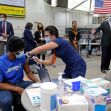With over 312 million doses of COVID-19 vaccines given to individuals in 106 countries, and a rough rate of 8.08 million doses a day, governments and industries are looking for ways to reopen, restart trade, and resume international travel. While records of vaccinations aren’t an inherent violation of privacy, as the earlier ideas of immunity passports would have been, there are still legal and ethical complications to enforcing an inoculation verification and documentation system.
The United States has already begun its preparation for what could be a COVID-19 vaccination passport. President Biden’s Executive Order 13988, Promoting COVID-19 Safety in Domestic and International Travel, issued on January 21, 2021, prompted relevant government agencies to “assess the feasibility of linking COVID-19 vaccination to International Certificates of Vaccination or Prophylaxis (ICVP) and producing electronic versions of ICVPs.”
Immunity Passports versus Vaccination Passports
The idea behind an immunity or vaccination passport is to assist in the reopening of world markets and travel. Every industry has been negatively impacted by the COVID-19 pandemic; however, the travel and hospitability industries have been hit the hardest. One thing that has not helped the two industries is the differing and often confusing requirements for entry into each country.
Fewer people are traveling, and inconsistent restrictions of entry are a force multiplier dissuading people from purchasing the goods and services of the travel industry, which hurts private companies and host countries alike. The ideal documentation certifying immunity to COVID-19 would efficiently make it clear to airline carriers, customs officials, and any public building or business that the carrier is immune from the COVID-19 virus.
The early idea to solve these problems was to create an immunization passport. This idea came out before any vaccine had been introduced or certified as effective; therefore, the only way an individual could prove their immunity was to show certification that they had already had COVID-19 and had recovered with the necessary antibodies in their immune system.
This idea never got off the ground because it would have led to violations of privacy and disability laws in the United States.
Now that multiple vaccinations have passed clinical trials and proven to be effective, there is more than one way to prove immunity. A vaccination passport would capture this information, whether it be proof of antibodies, vaccination, or a negative COVID-19 test result to provide to border officials and airlines.
Two major legal concerns are facing the development of a vaccine passport in the United States. The first and foremost is the protection of an individual’s privacy rights under applicable U.S. law. The second is how and where the vaccine passport would be used.
U.S. Law on Health Privacy
The first law that comes to mind when discussing health care and privacy is often HIPAA, the Health Insurance Portability and Accountability Act of 1996. This federal law required the creation of national standards and protects patient health information from being shared without authorization or knowledge. This law is enforced and regulated by the U.S. Department of Health and Human Services (HHS).
HIPAA has the dual (and sometimes dueling) objectives to protect the health information of individuals and at the same time support officials to secure public health. Disclosures of health information without prior authorization are permitted to any public health authority “that is authorized by law to collect or receive such information for the purpose of preventing or controlling disease.” This authority allows state, local, and federal officials to collect information on immunizations of those in their jurisdictions. This power has recently been used to show the percent of persons vaccinated in cities, counties, and states. However, it could be expanded in the future to cover a wider net of activities the public participates in.
How and Where the Vaccine Passport Will be Used
Outside of protecting an individual’s privacy, the other concern with vaccination documentation is how and when it will be used. Nita Farahany, the Robinson O. Everett professor of law and philosophy at Duke University, warns that vaccination cards could do more harm than good. She states, “the cards could easily become de facto entry documents required for people to attend school, get a job, dine at a restaurant or patronize businesses.” This could promote exclusion and discrimination not just in the travel industry, but for people to make a livelihood and provide for themselves.
In the workforce, the Equal Employment Opportunity Commission (EEOC), which enforces workplace anti-discrimination laws, classified COVID-19 as a “direct threat” to the workplace. This designation allowed employers to test employees for infections before letting them return to work. The EEOC also stated that they “do not interfere with or prevent employers from following the guidelines and suggestions made by the CDC or state/local public health authorities” in what it means for individuals to prevent the spread of COVID-19.
Additionally, in December 2018, the Eighth Circuit Court of Appeals ruled that an employer can condition employment upon taking certain vaccinations, “as long as the vaccination is job-related and consistent with business necessity.” This court opinion, Hustvet v. Allina Health Systems, considered the rubella vaccination. However, now that COVID-19 has impacted every employer and every industry, it could be seen as a vaccine that is “consistent with business necessity.”
The EEOC is also responsible for enforcing the Americans with Disabilities Act. Under their guidance regarding a COVID-19 vaccination, an employer can request proof of a COVID-19 vaccination because it is unlikely to elicit information about a disability, and therefore cannot be classified as a disability-related inquiry. If an employee is required by their employer to get a COVID-19 vaccination to report to work and the employee cannot get the vaccine because of a disability or a “sincerely held religious belief,” the employer is permitted to exclude the employee from the workplace, which doesn’t inherently mean termination.
If this documentation is required in social settings, by local businesses, or as a condition of employment, the larger concern is that vaccination documentation like a vaccine passport will create a tiered society, much like normal travel documents do on the international stage. Individuals who cannot get the COVID-19 vaccine, for whatever reason, will be disadvantaged compared to those who are able and choose to be inoculated against the virus. The current laws regulating equal opportunities and inclusion have a history of ruling in favor of public health over an individual’s right to choose not to get a vaccine. This will be a much larger legal concern if vaccine passports or cards become a “de facto entrance permit” to essential places such as grocery stores or health clinics, as Farahany has warned.
Examples Currently In Use
The International Certificate of Vaccination or Prophylaxis, informally referred to as the “yellow card,” is a World Health Organization (WHO)-approved vaccination travel document that is recognized internationally. In 1969, the WHO Health Assembly adopted the International Health Regulations which produced this certificate which has gone through amendments throughout the decades as diseases such as cholera and smallpox were either controlled or eradicated, respectively. Currently, the form is used most frequently for international travelers to countries that still have a high risk of yellow fever. Some countries, such as Nigeria, have already taken that step forward to introduce and require a digital version of this certificate.
There is no equivalent to the WHO’s yellow card. Some of the main obstacles facing a COVID-19 vaccination passport are the international standards required to accept them. It took years for the yellow card to be developed, and creating a universal COVID-19 vaccination passport will likely have to be deliberated in the same way.
Current Models In Use Or Trial
The International Air Transport Association (IATA), which sets the global standard for airline safety and security, created the Travel Pass initiative to resume international travel. The Travel Pass is an application for smartphones that is a database registering international travel restrictions and how and where to comply with those controls such as the nearest testing and/or vaccination sites. The application also has a direct link to personal lab results, COVID-19 testing history, and vaccine or testing certificates. It can be shown directly to airlines and border control officials to show compliance with individual country restrictions. Currently, 12 international airlines are using the IATA Travel Pass, including Qatar Airways and Emirates. No U.S.-based air carriers have adopted the pass, yet.
While there are no pressing legal ramifications at present of enforcing a vaccine passport for international travel, if their use is expanded to everyday routine uses, it could cause ethical concerns over who has the privilege to easily travel throughout their home society. This documentation could effectively create travel restrictions without even crossing an international border.






